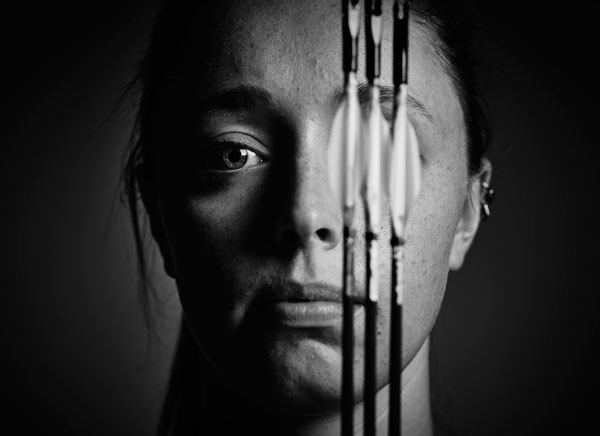
“I always had the intention of making the international team and as soon as it started I went, ‘actually I want to be on the target team as well and make the Olympics’”
Bryony Pitman cemented her status as a regular on Britain’s senior archery team this year, after a successful run in the junior ranks culminated in her winning gold at the Marrakesh stage of the Indoor World Cup last year – her first senior international medal. It’s all part of the process for the history student though, as she explains, archery’s been part of her life and ambitions for a very long time.
“Because my dad competed internationally for the field team I kind of always started with the intention of making the field team. I always had the intention of making the international team and as soon as it started I went, ‘actually I want to be on the target team as well and make the Olympics’ and all these kinds of possibilities came about. I think I did a competition within about two months of starting, just a small junior one, and then the following year I was competing even more, and I saw a series of stepping stones – to make the county team, make the England team and the national squad, and then the international team from that.”
Her dad and his archery career have had a huge impact on hers; not just getting her started on her archery journey, but continuing to provide support and assistance. “He’s my coach anyway,” she explains, “and since I’ve been on the squad as well he’s learnt even more from Lloyd and Songi about how to coach me technically, but then he’s also really good on the mental side of things, just because he’s kind of been there, he’s been in that position, rather than somebody coming in that’s a good technical coach but hasn’t done it themselves, so he gets how I’m feeling. If I’m getting wound up, if it’s not going right, he knows the right things to say.”
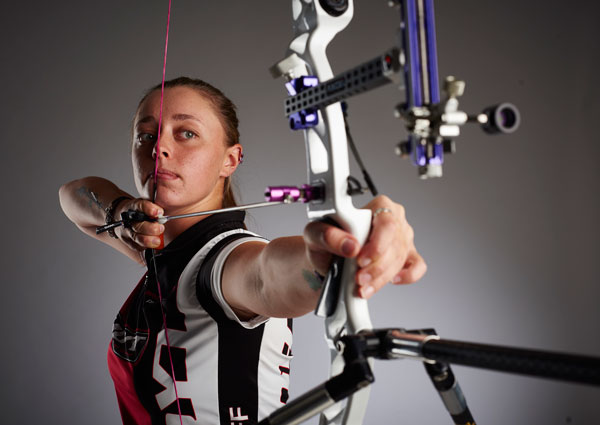
“I am an adrenaline junkie, I will absolutely admit that”
Bryony officially made the transition to the senior team at the international level last year, and says that a combination of her earlier experiences on the junior team and the domestic training setup at Archery GB helped with that. “I think it’s been fairly easy for me … I think I got a bit lucky with the way I progressed through the squad. Because I was kind of there or thereabouts, when I was up at Lilleshall I was getting coaching from Lloyd, and I was then on the senior squad at the end of 2012, when I was 15, and I think just because I was around the other seniors and competing with them it was like, “That’s the standard I need to be at” and I just kind of kept working. When I made my first World Cup, which was the beginning of last year, I’d already been in that kind of senior environment for a few years nationally, so it wasn’t too overwhelming.”
In the intervening years, she finished school and went to university, and says balancing studying with shooting has definitely got harder as time’s gone on – though archery was still very much a priority. “To start with it wasn’t too bad,” she says, before adding, “I missed two of my GCSE exams … at the time that was a bit like ‘Oh God!’ but compared to how it is at the moment it was nothing. I missed half of my A-Level exams!” she laughs, “Then I had a gap year 2015 to 2016, with the intention of going to the Olympics, just to give myself the best possible chance. Then I started uni last September… and it’s not been as easy as I thought it was going to be. I cruised through school a bit, and then started uni and it was like, “Oh, I’ve actually got quite a lot to do.” I have a good time-management plan, and if I follow it it runs quite smoothly, but it’s when I don’t follow it that problems arise. I ended up with a week to write two essays, eight portfolio pieces and two presentations; I didn’t give myself enough time, and that was between Antalya and Salt Lake World Cups as well, so it was absolutely mental. But I’ll always choose training over any kind of academic work… it’s been good for the archery but a bit of a problem for the school side of things!”
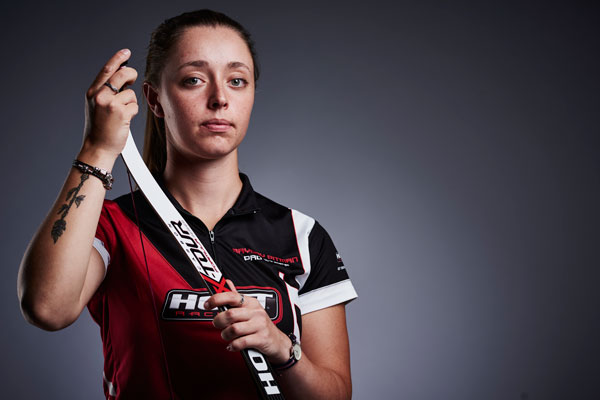
Though they live on different sides of the country, the team are close friends and remain in regular contact
As an established and regular member of the international team, how does she see events like the World Cups developing her as an archer and competitor? “I think just constantly putting myself in that high-level competition – I think it’s more of a mental thing, because all the technical stuff you can do and work on at home, but it’s just having a strong enough mentality to shoot two good halves of qualification and then, regardless of how your qualification goes, go into the matches almost like a blank slate. Whether you ranked first or last, if you’re shooting well you’ve got just as much of a chance as anybody else, and it’s just learning to accept – especially at that level – that sometimes you can shoot really well and you’ll still lose. Rather than, sometimes you can shoot really badly and win, and it’s kind of learning how to cope with that. So it’s learning how to deal with that at the time, and then afterwards as well, and learning from it.”
She pinpoints that as one of the biggest changes in understanding, adding, “I think sometimes you get used to winning being easy, and because in this country the levels are so variable, then you go away and it’s such a high level that you have to learn to come back if you’re 4-0 down, or if you’re 4-0 up and you have to win that last set, and that’s definitely been a big learning curve.”
She identifies participation and pressure as the factors she’d bring from the international experience to the domestic scene to push home archers forward – not just competition participation more widely, but participation in high-level shooting practices. “I’d really like to see some of the younger archers more involved with the senior programme” she says, “So whether that’s going up to Lilleshall … or shooting match practice at home, and really challenging themselves, shooting against compounds and stuff like that, so they have to be shooting 10s. Just putting themselves in situations to have to shoot higher scores. When I was first on the junior squad, it was me, Becky Martin and Abbie Fisher that were the three cadet girls, and even though I started off at a lower level than them, shooting with them and doing matches – even if I lost – just because they were always shooting better I was always trying to improve and try and catch them up. So things like that definitely help.”
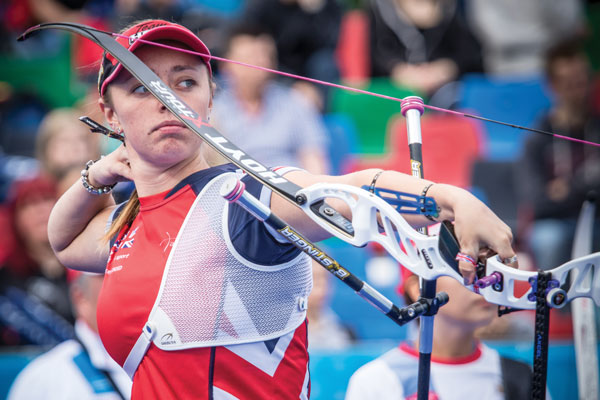
“The style of shot that I shoot I think can be one of the most consistent ways of shooting, just because it all revolves around relaxing”
The conversation turns to the recent news that a mixed team medal will be available at the Olympics for the first time in Tokyo. Having shot it as part of the Youth Olympic Games, what does she think that’s going to do for archery and archers? “I think it’s a really good opportunity, because other sports like athletics, gymnastics, and so on, have so many more medal opportunities, whereas with archery we’ve only ever had two – and that’s on the condition you get a team place. I think it’s a great opportunity; it’s another medal opportunity and it’s a chance to make archery in the Olympics bigger and it’s definitely a benefit for the smaller countries as well. Our problem at the moment is we don’t have a third woman that’s making the team, so for countries that struggle to get three of each they’ve got another opportunity, another way in to the Olympics. And having shot it at the Youth Olympics – it was a mixed country one then though, so I shot with a guy from Belarus – it was just so much fun. I think the idea of the mixed team is really enjoyable. It’s always nicer shooting in a team than on your own, and if you’re nervous you can kind of help each other out; I’m really looking forward to it, and I think we’ve got a good chance of getting a mixed team place.”
Speaking of Olympics, she confirms that’s absolutely the ultimate goal. “Yes, definitely. Missing out last year, because it was so close, it could have gone either way – it could have absolutely destroyed me. But instead as soon as I knew I wasn’t going to Rio, I was like, I want to do everything I can to make sure that doesn’t happen for Tokyo. And I think that was the biggest change of my training over the winter; everything was so focused, like, “I don’t want to miss out on that opportunity so I’m going to do absolutely everything I can”, and I trained really hard and had a really good indoor season. So that’s the ultimate goal – hopefully more than one Games as well!”
That’s not to say the intervening three years will be quiet; “I looked over the few years leading up to the next Games, what I have to be doing in terms of world ranking and placing at events, in order to give myself the best opportunity to go to the Games, and also to give myself the best opportunity to be a medal potential at the next Games as well. So obviously there’s the World Champs at the end of this year, I’d like to be at least top 16 in that, then the World Champs in a couple of years – that’s the first time to win places so the goal there would be to medal, and have a team in a good position to medal as well. So I think that’s the main thing for the rest of this year is to find a third girl, and to get some of the juniors shooting slightly higher scores more consistently, and kind of build the squad up as well so everybody’s pushing each other, and it’s not like, “I’m shooting well so I’m going to be on the team” where it’s easy, kind of thing. And then, medals at European Championships, hopefully make a World Cup Final – maybe not this year but definitely next year and subsequent years, be looking to do that.”
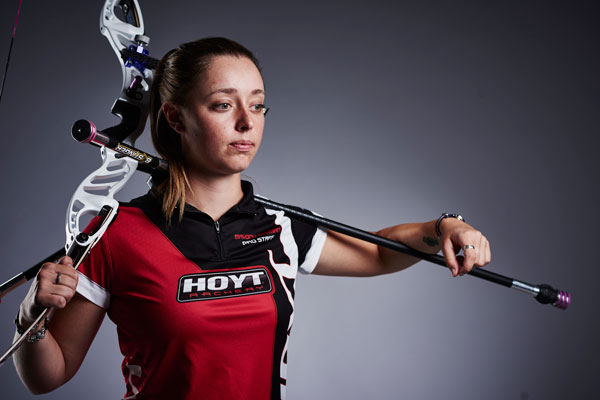
“I try not to let the bad days affect me too much and try to remember why I shoot and how much I love it “
That’s quite a list, but Bryony has a strategy worked out to make sure nothing gets neglected. “Strength has been a massive thing for me – one of the things Songi always said was I need to be stronger, so in the middle of last year I started going to the gym a lot more and that increased over the winter, and that’s definitely helped a lot and is something I’m going to continue doing. Technical things, there’s a couple of little things that I’m working on, but it’s more maintenance now. And then the mental side of things is making myself tougher mentally, and making sure that I’m learning the right things from competition, whether I win or lose, making sure I’m getting the most out of what I’m doing.
“I’ve gone into each competition with a goal, not just outcome related but something I want to take from it at the end of it, and I’ve planned that for each competition that I’m going to this year. I’ve thought about the World Championships being the end goal for this year, so every competition that I do leading up to that there’s got to be a reason for me to do it. I’ve got that all written out, and I’ll re-visit it before the competition so I know what I’m wanting to achieve going into it, and then it’s trying to get the best out of it.”
Looking at the future of archery more generally, she sees archery’s presentation to the wider public as an important feature of its development. “I think there needs to be more publicity,” she says, “because although all these things are getting changed and introduced, there’s still not enough backing from… big media, I guess. I think something like that would really help, because then not only does it get more people interested in the sport, but it could also potentially help with funding, and things like that, especially with us losing our Olympic funding this year. I think maybe if we had a bit more publicity, and it made it a bit more obvious that archers could give something back to whoever was showing us off; I think something like that would help.”
Having picked up medals at the Indoor World Cup and World Field Championships – and a plan in place to collect plenty more – it looks as if the senior stage is just the start.
This article originally appeared in the issue 119 of Bow International magazine. For more great content like this, subscribe today at our secure online storewww.myfavouritemagazines.co.uk

